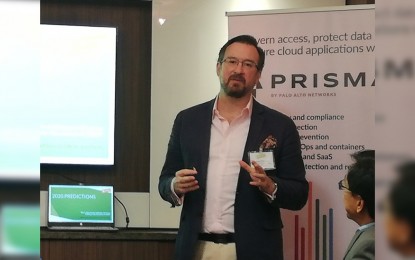
Palo Alto Networks Field Chief Security Officer for Asia Pacific Kevin O’Leary
MANILA – A technology expert said on Thursday there is no need to worry about the supply of cyber security talents since there are ways to address this, such as automation and use of alternative sources.
In a briefing, Palo Alto Networks Field Chief Security Officer for Asia Pacific Kevin O’Leary said there are more than a million cyber security talent shortage in the Asia Pacific.
O’Leary said the term cyber security is now a common term and company executives are looking for people who are experts on this field.
However, he said companies are looking for talents in the wrong places, pointing out that “if they are going to operate security tools then, they don’t have to be cyber security veterans.”
For one, a database administrator is not much different from being an administrator for an anti-virus network or managing information detection which are technical functions that people can be trained on.
“The general aptitude for technology is important for some of those roles. The second thing is that we are beginning to recognize that cyber security goes beyond technology so it’s not just about being a technical role. It’s about being a business role and understanding where cyber security fits within the business,” he said.
With these factors, O’Leary said what is important to look into is people’s intelligence quotient (IQ) and emotional quotient (EQ) because the “emotional aspects of understanding risk and understanding the application of technology within a business context is the next really important for cyber technology.”
Meanwhile, O’Leary said while there are moves to shift to 5G, the fifth-generation technology, there is not much difference between this and 4G vis-à-vis consumers’ experience on using their mobile phones and TVs, among others.
He said the difference is more pronounced for automation of internet of things (IoT), which is a system that interconnects computing devices, mechanical and digital machines, objects, animals and people.
Among the sectors that are seen to benefit from 5G is the medical sector since doctors will be able to operate on patients without being with the latter physically, the agriculture sector, specifically the farmers; and the information technology (IT) sector.
O’Leary said the issue on the domestic front for 5G is the need for better fiber network, which he said is essential for more sectors to benefit from it.
During the same briefing, Palo Alto Networks Country Manager for the Philippines Oscar Visaya said the government has enough regulations and policies to date with regards to cyber security and the push for 5G.
Visaya said although there is seeming lack of pronouncement for support of 5G, authorities have challenged the private sector to be updated and to increase internet connection speech in the country.
He said a faster internet connection is an enabler for the economy since it allows services to be delivered faster.
“I don’t think there is an issue on policy because the frequencies are awarded by the government,” he said. (PNA)
